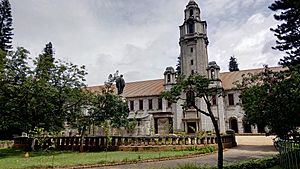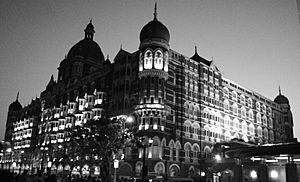Tata Group facts for kids
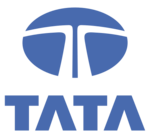 |
|
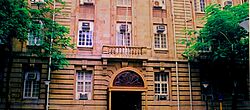
Bombay House, the headquarters of Tata Group in Mumbai, India
|
|
| Corporate group | |
| Industry | Conglomerate |
| Founded | 1868 |
| Founder | Jamsetji Nusserwanji Tata |
| Headquarters |
,
India
|
|
Area served
|
Worldwide |
|
Key people
|
|
| Products |
|
| Services | |
| Revenue | |
|
Operating income
|
|
|
Number of employees
|
1,151,353 (March 2025) |
| Subsidiaries | 35 (See full list) |
| Footnotes / references Financials as of 31 March 2025[update]. |
|
The Tata Group is a very large Indian company. It is a group of many different businesses. Its main office is in Mumbai, India. The company started way back in 1868. Today, it is India's biggest business group.
Tata Group includes many smaller companies. Tata Sons is the main company that owns and manages them. As of August 2025, 29 of these companies are listed on the stock market. Their total value is about US$436 billion.
Contents
History
The Tata Group was started by Jamsetji Nusserwanji Tata. He and his father faced some tough times in business. But their luck changed in 1868. They got a good deal to supply goods for a British army trip.
Jamshedji Tata had four big dreams. He wanted to start a steel company. He also wanted to build a famous hotel. Another dream was to create a top-notch school. Finally, he aimed to develop electric power from water.
Early Years (1868–1937)
In 1870, Jamshedji started his own trading company. He bought an old oil mill and turned it into a cotton mill. He sold it for a good profit. In 1874, he opened another cotton mill called Empress Mill.
In 1903, the company opened the Taj Mahal Hotel in Mumbai. It was the first hotel in British India to have electricity.
After Jamshedji passed away in 1904, his son Dorabji Tata took over. Dorabji started the Tata Iron and Steel Company (TISCO) in 1907. This company is now known as Tata Steel. Tata also opened its first office outside India in London. They built the first hydroelectric power plant in Western India, creating Tata Power. Another dream came true when the Indian Institute of Science opened in 1911.
Growth and Expansion (1938–1991)
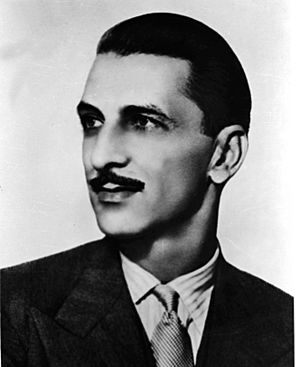
J. R. D. Tata became the chairman in 1938. Under his leadership, the Tata Group grew a lot. It went from 14 companies to 95 companies by 1988. They started businesses in new areas. These included chemicals, technology, cosmetics, and tea.
In 1932, Tata started its own airline. It was first called Tata Air Services. Later, it became Tata Airlines and then Air India. In 1953, the Indian government bought most of the airline. But JRD Tata stayed as chairman until 1977.
Tata Motors was founded in 1945. At first, it made train engines. In 1954, it started making commercial vehicles. Tata Consultancy Services was started in 1968. This company works with computer services.
Modern Era (1991–Present)
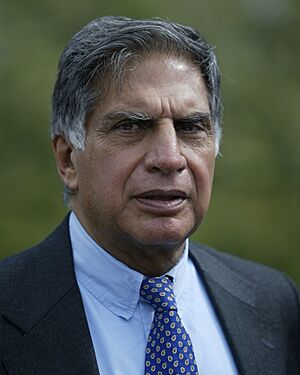
In 1991, Ratan Tata became the chairman. This was also when India opened its markets more to foreign companies. During this time, Tata Group started buying many companies.
Tata Group bought Tetley Tea in 2000. They also bought Corus Group, a steel company, in 2007. In 2008, Tata Motors launched the Tata Nano. This car was known as "the world’s most affordable car." Tata Motors also bought Jaguar and Land Rover from Ford Motor Company.
In 2017, Natarajan Chandrasekaran became the chairman. He has helped the group grow even more. He focused on areas like online shopping and healthcare. Under his leadership, Tata Group also bought Air India back. They also fully bought Air Asia India.
In 2023, Tata-owned Air India got approval to buy AirAsia India. This means AirAsia India is now fully part of Air India.
Chairman
The chairman of Tata Sons is usually the leader of the Tata Group. Here are the people who have been chairman:
- Jamsetji Tata (1868–1904)
- Sir Dorabji Tata (1904–1932)
- Sir Nowroji Saklatwala (1932–1938)
- J. R. D. Tata (1938–1991)
- Ratan Tata (1991–2012, 2016–2017)
- Cyrus Mistry (2012–2016)
- Natarajan Chandrasekaran (2017–present)
What Tata Group Does
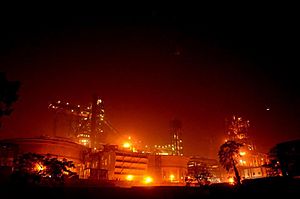
The Tata Group is involved in many different types of businesses around the world. Here are some of the main areas they work in:
- Cars and Vehicles: Tata Motors makes cars, trucks, and buses. They also own famous brands like Jaguar Land Rover.
- Steel: Tata Steel is one of the biggest steel producers.
- Technology: Tata Consultancy Services (TCS) is a huge company that provides computer services and software.
- Power and Energy: Tata Power generates electricity and works with solar energy.
- Chemicals: Tata Chemicals makes different kinds of chemicals.
- Retail and Shopping: They own stores like Trent and online shopping platforms like Tata Neu and BigBasket.
- Consumer Products: Tata Consumer Products makes things like tea (Tetley) and other food items. They also have Tata Starbucks coffee shops.
- Hotels: Indian Hotel Company owns many hotels, including the famous Taj Hotels.
- Airlines: They own Air India and Air India Express.
- Financial Services: Tata Capital offers loans and other money-related services.
- Telecommunications: Tata Communications provides phone and internet services.
Big Purchases
Tata Group has grown a lot by buying other companies. Here are some of their notable acquisitions:
- In 2000, they bought Tetley Tea Company.
- In 2007, they acquired Corus Group, a large steel company.
- In 2008, Tata Motors bought Jaguar Cars and Land Rover.
- In 2021, Tata Digital bought BigBasket (an online grocery store) and 1mg (an online pharmacy).
- In 2021, Tata Group bought back Air India and Air India Express.
- In 2024, Tata Consumer Products bought a large part of Capital Foods.
Helping Others (Philanthropy)
Tata Group is also known for its charity work. They have helped start and fund many schools, research centers, and cultural places in India. They even received a special award for their charity work.
- In 2008, Tata Group gave US$50 million to Cornell University. This was for farming and nutrition programs in India. It also helped Indian students study at Cornell.
- In 2010, they donated money to Harvard Business School. This helped build a new building for executive education.
- In 2017, Tata Trusts gave US$70 million to University of California, San Diego. This helped set up a special institute for genetics and society.
- In 2017, Tata Consultancy Services (TCS) gave US$35 million to Carnegie Mellon University. This was to work on new technologies like self-driving cars.
- In 2020, Tata Group donated a lot of money to help India fight the COVID-19 pandemic.
- In 2024, Ratan Tata started the Tata Trusts' Small Animal Hospital in Mumbai. It provides medical care for pets like dogs, cats, and rabbits.
Tata Trusts
Most of the charity work of the Tata Group is done through special trusts. These trusts were started by members of the Tata family. Some of the main trusts include:
- Sir Dorabji Tata Trust and Allied Trusts
- Sir Ratan Tata Trust & Allied Trusts
See also
 In Spanish: Grupo Tata para niños
In Spanish: Grupo Tata para niños
- List of companies of India
 | Victor J. Glover |
 | Yvonne Cagle |
 | Jeanette Epps |
 | Bernard A. Harris Jr. |


